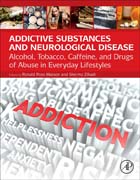
Addictive Substances and Neurological Disease: Alcohol, Tobacco, Caffeine, and Drugs of Abuse in Everyday Lifestyles
Watson, Ronald Ross
Zibadi, Sherma
Addictive Substances and Neurological Disease is a complete guide to the manifold effects of addictive substances on the brain, and reviews developing research on how these substances are implicated in neurological development and dysfunction. Cannabis, cocaine, and other illicit drugs can have substantial negative effects on the structure and functioning of the brain. However, other common habituating and addictive substances often used as part of an individual's lifestyle alcohol, tobacco, caffeine, painkillers can also compromise brain health, and can effect or accentuate neurological disease. This book provides broad coverage of the effects of addictive substances on the brain, beginning with an overview of how the substances lead to dysfunction before examining each substance in depth. It discusses the pathology of addiction and the structural damage resulting from abuse of various substances, and covers the neurobiological, neurodegenerative, behavioral, and cognitive implications of use across the lifespan, from prenatal exposure to adolescents to the elderly. This book aids researchers seeking an understanding of the neurological changes that these substances induce, as well as those seeking potential treatments and therapies for individuals suffering from abuse of these substances. Integrates current research on the actions of addictive substances in neurological diseaseIncludes functional foods. such as caffeine beverages, that have habituating effects on the brainProvides synopsis of key ideas associated with the consequences of addictive and habituating lifestyle substances INDICE: Part I. Alcohol and Neurological Dysfunction 1. Acute Ethanol-induced Changes in Microstructural and Metabolite Concentrations on the Brain:Noninvasive Functional Brain Imaging 2. Prenatal alcohol exposure and neuroglial changes in neurochemistry and behavior in animal models 3. Alcohol on Histaminergic Neurons of Brain 4. Antenatal Alcohol and Histological Brain Disturbances 5. Alcohol Intoxication and Traumatic Spinal Cord Injury: Basic and Clinical Science 6. Visual and Auditory Changes after the Acute Alcohol Ingestion 7. Zebrafish models of alcohol addiction 8. Effect of alcohol on the regulation of ?-synuclein in the human brain 9. Consumption of ethanol and tissue changes in the central nervous system 10. Ethanol comsuption and cerebellar disorders 11. Gene Expression in CNS Regions of Genetic Rat Models of Alcohol Abuse 12. Role of Tlr4 in the Ethanol-Induced Modulation of the Autophagy Pathway in the Brain 13. Ghrelinergic Signaling in Ethanol Reward 14. Alcoholic Neurological Syndromes 15. Frontal Lobe Dysfunction after Developmental Alcohol Exposure - Implications from Animal Models 16. Ethanol's action mechanisms in the brain: From lipid general alterations to specific protein receptor binding 17. Antioxidant vitamins and brain dysfunction in alcoholics 18. Serotonin Deficiency and Alcohol Use Disorders Part II. Addictive Substances and Behavioral Health 19. Functional reorganization of reward- and habit-related brain networks in addiction 20. Ethanol: Neurotoxicity and Brain Disorders 21. Functionally relevant brain alterations in polysubstance users: Difference to monosubstance users, study challenges, and implications for treatment 22. Deep Brain Stimulation: A possible therapeutic technique for treating refractory alcohol and drug addiction behaviors Part III. Tobacco Smoking in Neuromodulation 23. Understanding the Roles of Genetic and Environmental Influences on the Neurobiology of Nicotine Use 24. Tobacco Smoke and Nicotine: Neurotoxicity in Brain Development 25. Paradise Lost: A New Paradigm for Explaining the Interaction Between Neural and Psychological Changes in Nicotine Addiction Patients 26. The interactions of alcohol and nicotine: CNS sites and contributions to their co-abuse 27. Role of Basal Forebrain in Nicotine Alcohol Co-Abuse 28. Chronic and acute nicotine exposure versus placebo in smokers and non-smokers: A systematic review of resting state fMRI studies Part IV. Drugs of Abuse and Brain Structure and Function 29. Novel Psychoactive Substances: a new Behavioral and Mental Health Threat 30. Cholesterol and caffeine modulate alcohol actions on cerebral artery and brain 31. Sleep, Caffeine, and Physical Activity in Older Adults 32. Ketamine: Neurotoxicity and Neurobehavioural Disorders 33. Left/right hemispheric unbalance model in addiction
- ISBN: 978-0-12-805373-7
- Editorial: Academic Press
- Encuadernacion: Cartoné
- Páginas: 400
- Fecha Publicación: 01/04/2017
- Nº Volúmenes: 1
- Idioma: Inglés
